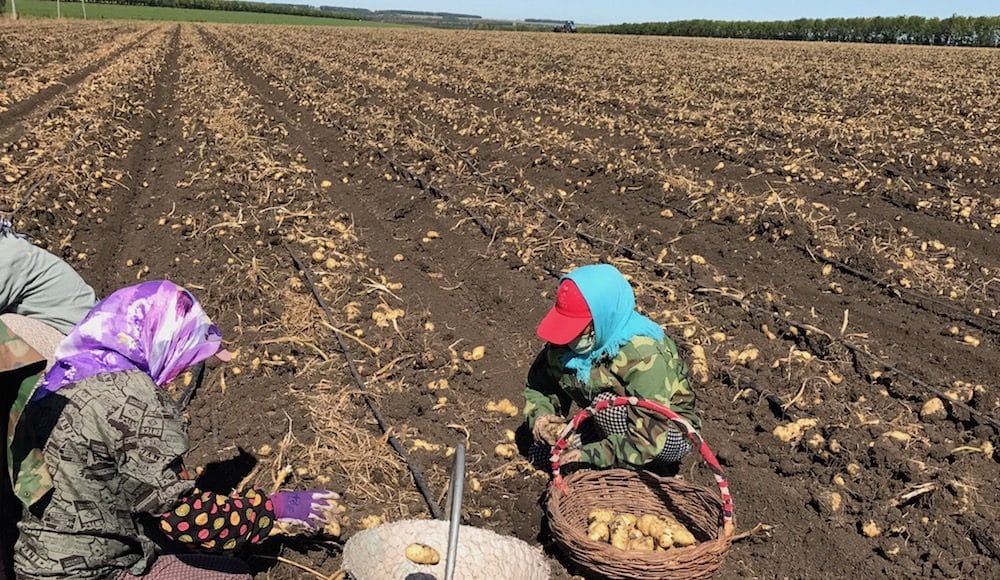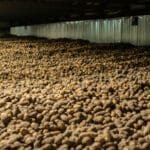[deck]WPC 2015 played a pivotal role in helping drive China’s Potato as a Staple Food Policy forward.[/deck]
Hundreds of potato stakeholders from around the globe will descend on Cusco, Peru, in May for the 10th World Potato Congress (WPC). One the largest groups of participants will be from China, the leading potato producer in the world and the host nation for the last WPC in 2015.
According to Peter VanderZaag, a WPC director and one of the key organizers of WPC 2015 as well as WPC 2018, the event in China was a tremendous success for the host country. WPC 2015 was held in Yanqing near Beijing, China, only a few months after the government unveiled plans to ramp up potato production and promote consumption of potato products as part of a new Potato as a Staple Food Policy.
At the 2015 congress, many world experts attended and interacted with Chinese scientists and people in the industry to help them move ahead with potato as a staple food in China. “I would say it was hugely successful in that way, and China really benefited greatly from this high-profile event,” says VanderZaag.
“It was great for raising awareness of what’s going on in China with potatoes and what they want to do with potatoes,” adds VanderZaag, a prominent Canadian potato grower and scientist who has helped the Chinese grow their potato industry since the 1980s. In 2014, he received the National Friendship Award, China’s highest accolade for foreign experts who have made outstanding contributions to the country’s economic and social progress.

Attendance for WPC 2015 was reported to be around 1,200 people. VanderZaag says there were hundreds of Chinese among that number — a good indicator of the strong interest in the event in China. The country also hosted the 5th World Potato Congress back in 2004, when the triennial event was held in the Chinese city of Kunming.
David Thompson, the Canadian past president and CEO of the WPC who handed over leadership of the organization to Belgian Romain Cools in January, says the knowledge sharing and networking opportunities provided by WPC 2015 were a boon to the Chinese potato industry. “It was a great success for them,” he says.
Cools believes the congress in 2015 played a pivotal role in helping drive China’s Potato as a Staple Food Policy forward.
“I believe that WPC 2015 was an important step forward towards a potato-driven food system in China and by extension Asia. New initiatives on the crop as well as the processing in China have been taken since then and will continue in the coming years. The role of the World Potato Congress as a premier networking organization could not be better illustrated,” he says.
WPC 2015, which included an international workshop on potato as a staple food in China, was just one of several major potato events that took place in China that year.
“I believe that all activities in 2015 delivered a kind of confidence to develop potato industry in China, not only for the field production, but also for scientific research and the processing sectors,” says Xiaoping Lu, the director of the International Potato Center-China Center for Asia Pacific (CCCAP) located in Yanqing.
Lu is travelling to Peru for WPC 2018, which runs from May 27 to 31 in Cusco, and he estimates that at least another 130 or so Chinese delegates will be there as well.
That’s a substantial portion of the total number of people expected to attend the event (according to organizers, WPC 2018 attendance has been capped at 675 due to seating limitations). Cools believes the large Chinese representation is reflective of the continued recognition of the WPC’s value among potato stakeholders in countries like China.
“As a board, we have decided to move the congress in the future further to its role of being the global networking organization of the whole potato chain,” Cools says. “I guess the size of the Chinese delegation will illustrate that this is the right aim. More contacts will help the Chinese potato sector to move forward and will also inspire other potato professionals to take part in it.”
Cools adds events like the WPC enable participants from China and other rising potato markets to investigate the growing opportunities for public/private partnerships within the global potato sector.
“In the potato value chain of Europe and North America, most of the innovations are happening in the private sector. It seems an excellent opportunity for new created value chains to look for successful partnerships,” he says.

Kaiyun Xie, a renowned potato scientist who’s been a special advisor to the World Potato Congress since 2015, is another delegate from China. He says many Chinese potato researchers like himself are now benefiting from bigger budgets that allows them to attend major events like the WPC.
Xie will be attending WPC 2018 to talk about his innovative research work in China as well as to learn how potato technology has progressed globally since the last congress. In addition, he’ll be seeking opportunities for collaborations on business or research.
Xie is also looking forward to showing some of his colleagues around the International Potato Center headquarters in Lima, Peru, where he used to work. Many of the Chinese participants at WPC 2018 who will be travelling to Peru have never been there before, he says, “and it is a dream for all potato people to have a look at potatoes in their original place.”
Xie is chief technology officer for Xisen Potato Industry Group Co. Ltd. in Leling, China, a large private farm company that is one of the country’s biggest seed potato producers and which also develops potato products for the food market.
In addition, Xie is the director of the National Potato Engineering Research Center in Yanqing, China, and he’s also working on establishing a new research and development hub for aeroponic potato production, which he says will be the only facility like it in the world.
“I think China might be the only country in the world to invest so much budget on potato research and development,” notes Xie. Two examples, he says, are the National Natural Science Foundation of China, which invests millions into fundamental potato research each year, and the National Modern Potato Research System which includes 27 key scientists and 50 field stations throughout different ecological regions in China.
China’s CCCAP, which focuses on improving potato production across East Asia and the Pacific region, is also very active on the potato R&D front and is recognized as world-class agriculture research facility.
VanderZaag firmly believes potato research is one of the core strengths of the Chinese potato industry.
“I think as far as leading-edge research goes, the Chinese have really taken that and run with it,” he says. “China has many highly-skilled people who are well trained, many by the International Potato Center or other institutions in Europe or in North America, and who are now leading the work.”
According to VanderZaag, the Chinese government continues to invest heavily in potato research as well as agronomic improvements and business development, enabling the country to become a rapidly rising star in the potato industry.
“It’s a good time to be a potato scientist or researcher in China,” he says.











